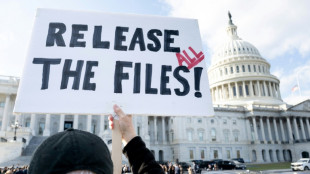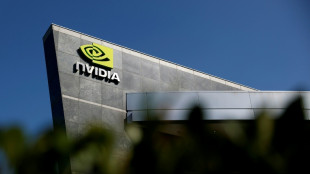
-
 US lawmakers set for explosive vote on Epstein files
US lawmakers set for explosive vote on Epstein files
-
Gianfranco Rosi: the slow documentary maker in a frantic world

-
 P.Priime, Nigeria's young leading Afrobeats producer
P.Priime, Nigeria's young leading Afrobeats producer
-
Merz, Macron to push for European digital 'sovereignty'

-
 Trump hosts Saudi prince for first time since Khashoggi killing
Trump hosts Saudi prince for first time since Khashoggi killing
-
Tonga's Katoa out of NRL season after brain surgery

-
 Japan warns citizens in China over safety amid Taiwan row
Japan warns citizens in China over safety amid Taiwan row
-
In Somalia, a shaky front line barely holds back the 'dogs of war'

-
 Shares in 'Baby Shark' studio jump on market debut
Shares in 'Baby Shark' studio jump on market debut
-
Thunder breeze past Pelicans, Pistons overpower Pacers

-
 Grieving Cowboys remember Kneeland, defeat Raiders
Grieving Cowboys remember Kneeland, defeat Raiders
-
Loaf behind bars: Aussie inmate says Vegemite a human right

-
 In film's second act, 'Wicked' goes beyond Broadway musical
In film's second act, 'Wicked' goes beyond Broadway musical
-
Asian markets track Wall St down with Nvidia, US jobs in view

-
 Scott Boland: the best 'spare' fast bowler around
Scott Boland: the best 'spare' fast bowler around
-
Fire and Ashes: England bank on fast bowling barrage in Australia

-
 North Korea says Seoul-US sub deal will trigger 'nuclear domino' effect
North Korea says Seoul-US sub deal will trigger 'nuclear domino' effect
-
Education for girls hit hard by India's drying wells

-
 Haitian gangs getting rich off murky market for baby eels
Haitian gangs getting rich off murky market for baby eels
-
Trump says will talk to Venezuela's Maduro, 'OK' with US strikes on Mexico

-
 Oscar Piastri wins Australia's top sports honour
Oscar Piastri wins Australia's top sports honour
-
'Severely restricted': Russia's Saint Petersburg faces cultural crackdown

-
 Polish PM denounces 'sabotage' of railway supply line to Ukraine
Polish PM denounces 'sabotage' of railway supply line to Ukraine
-
UK toughens asylum system with radical overhaul

-
 Carney's Liberals pass budget, avoiding snap Canada election
Carney's Liberals pass budget, avoiding snap Canada election
-
LeBron back in training, edges closer to Lakers return

-
 Climate talks run into night as COP30 hosts seek breakthrough
Climate talks run into night as COP30 hosts seek breakthrough
-
Germany and Netherlands lock up World Cup spots in style

-
 Germany's Woltemade hopes for 2026 World Cup spot after scoring again
Germany's Woltemade hopes for 2026 World Cup spot after scoring again
-
Germany 'send message' with Slovakia rout to reach 2026 World Cup

-
 Trump unveils fast-track visas for World Cup ticket holders
Trump unveils fast-track visas for World Cup ticket holders
-
Netherlands qualify for World Cup, Poland in play-offs

-
 Germany crush Slovakia to qualify for 2026 World Cup
Germany crush Slovakia to qualify for 2026 World Cup
-
Stocks gloomy on earnings and tech jitters, US rate worries

-
 'In it to win it': Australia doubles down on climate hosting bid
'In it to win it': Australia doubles down on climate hosting bid
-
Former NFL star Brown could face 30 yrs jail for shooting case: prosecutor

-
 Fate of Canada government hinges on tight budget vote
Fate of Canada government hinges on tight budget vote
-
New research measures how much plastic is lethal for marine life

-
 Mbappe, PSG face off in multi-million lawsuit
Mbappe, PSG face off in multi-million lawsuit
-
EU defends carbon tax as ministers take over COP30 negotiations

-
 McCartney to release silent AI protest song
McCartney to release silent AI protest song
-
Stocks tepid on uncertainty over earnings, tech rally, US rates

-
 Louvre shuts gallery over ceiling safety fears
Louvre shuts gallery over ceiling safety fears
-
'Stranded, stressed' giraffes in Kenya relocated as habitats encroached

-
 US Supreme Court to hear migrant asylum claim case
US Supreme Court to hear migrant asylum claim case
-
Western aid cuts could cause 22.6 million deaths, researchers say

-
 Clarke hails Scotland 'legends' ahead of crunch World Cup qualifier
Clarke hails Scotland 'legends' ahead of crunch World Cup qualifier
-
S.Africa says 'suspicious' flights from Israel show 'agenda to cleanse Palestinians'

-
 South Korea pledges to phase out coal plants at COP30
South Korea pledges to phase out coal plants at COP30
-
Ex-PSG footballer Hamraoui claims 3.5m euros damages against club


Western Hemisphere readies for a 'Ring of Fire' eclipse
Skygazers across the Americas are in for a celestial treat on Saturday: an annular solar eclipse.
These occur when the Moon passes between the Sun and Earth at its furthest point from our planet. Since it is so distant, it doesn't cover the Sun completely, creating a "ring of fire" effect.
In the United States, the most striking "path of the annularity" will cross a handful of major cities, including Eugene, Oregon, Alburquerque, New Mexico, and San Antonio, Texas, between 9:15 am to 11:50 am in local time zones, according to NASA, with partial eclipse phases lasting an hour or two before and after.
At any given location, it will be visible from between 30 seconds and five minutes -- but people are urged to take safety precautions and use solar viewing glasses, and never regular sunglasses, to preserve their vision.
"Do NOT look at the Sun through a camera lens, telescope, binoculars, or any other optical device while wearing eclipse glasses or using a handheld solar viewer —- the concentrated solar rays will burn through the filter and cause serious eye injury," NASA says.
Next it will cross Mexico and Central America, then into South America through Colombia and northern Brazil before ending at sunset in the Atlantic Ocean.
For those not lucky enough to be in the path of this special astronomical transit, NASA is also planning a live broadcast on nasa.gov/nasatv/ from 11:30am to 1:15 pm eastern time (1530 to 1715 GMT) from Albuquerque, New Mexico, as well as Carville, Texas and White Sands New Mexico.
- Sounding rockets -
The event also serves as a dress rehearsal before a total eclipse set for April 2024.
Both eclipses are going to be "absolutely breathtaking for science," said Madhulika Guhathakurta, a heliophysics program scientist.
Solar eclipses have a noticeable effect on the upper atmosphere, such as the ionosphere which is full of charged particles and responsible for reflecting and refracting radio waves.
"Although the atmospheric effects of solar eclipses have been studied for over 50 years, many unanswered questions remain," said Guhathakurta.
To study these effects, NASA will launch three rockets from the White Sands Missile Range in New Mexico to gather data on the electric and magnetic fields, electron density, and temperature.
A total eclipse took place in 2017 in the United States. After next April's total eclipse, the next one will take place in 2044, while the next annular eclipse will be in 2046.
Y.Zaher--SF-PST




